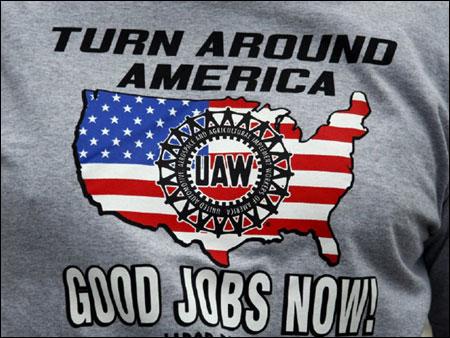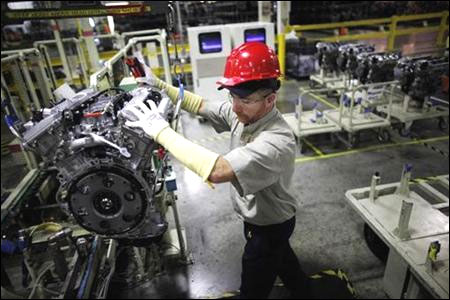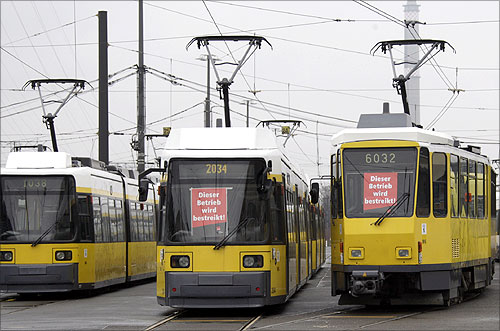 | « Back to article | Print this article |
Why politicians love low-skilled jobs
It's August 2007. Presidential candidate Barack Obama is huddled with his key economic advisers, the best brains that the economics fraternity in America can muster, plotting strategy.
Obama takes a swig from his water bottle, sits up erect and asks: "Okay, in year two of my administration, when the housing bubble finally bursts, I come to you guys as my economic advisers and say, 'What do we do?
How do we provide jobs for 10 million-plus low-to-moderately skilled male workers? What 'sunrise' could the US government stimulate?' "
Click NEXT to read more...
Why politicians love low-skilled jobs
The advisers break into an intense discussion and, a few minutes later, announce: healthcare. That's where the jobs of the future will be, they say. And the jobs of the future in America are nurses' aides, companions to infirm seniors, hospital orderlies.
Obama shakes his head.
"Look, these are guys", he says. "A lot of them see healthcare jobs such as nurses' aides as women's work. They need to do something that fits with how they define themselves as men."
Click NEXT to read more...
Why politicians love low-skilled jobs
This snapshot is from Ron Suskind's recent book, Confidence Men, but the actors could have been the prime minister of almost any country and his economic advisers.
Creating low-skilled jobs, the kind of jobs that almost anyone in a country can aspire to, is the real priority of any politician who has to face an electorate.
Herein lies the paradox. Most debates about education, whether about school level or higher education, assume that the goal of an education system is to produce Nobel Prize winners, Fortune 500 CEOs, Booker Prize winners - or at least top doctors, lawyers and accountants, all with multi-crore annual incomes. But the vast majority of jobs in any economy, however advanced, are far from these.
Click NEXT to read more...
Why politicians love low-skilled jobs
Robert Reich – who ought to know because he straddles the real world (he was Secretary of Labour in the Clinton administration) and the academic world (he currently teaches at the University of California, Berkeley) – says that 75 per cent of future jobs, even in the United States, are about delivering either "routine production services" or "in-person services".
Workers in "routine production services" do over and over again a sequence of steps to produce finished products in the traditional manufacturing industries, or routine computer coding and stuffing printed circuit boards in the modern ones.
Click NEXT to read more...
Why politicians love low-skilled jobs
"In-person service" workers also perform simple repetitive tasks, but they deliver them in person to the ultimate beneficiary - examples include retail sales workers, waitstaff, cashiers, hospital orderlies, auto mechanics and security guards.
Reich's third category of workers, those engaged in the delivery of "symbolic analytical services", is what we implicitly have in mind when we discuss education and its quality goals.
Click NEXT to read more...
Why politicians love low-skilled jobs
This category encompasses research scientists, software architects, investment bankers, lawyers, journalists and university teachers.
These kinds of jobs will account for, at best, eight per cent of jobs in the private sector in the United States of the future.
So, you can see, all the fretting and fuming that we engage in whenever the topic of education comes up concerns a single-digit percentage of people in any economy.
Click NEXT to read more...
Why politicians love low-skilled jobs
But if you are a politician in any democratic country who has to worry about getting re-elected periodically, you better fret and fume about creating the "routine service provider" and "in-person service provider" jobs that the vast majority of your voters are looking for.
Workers in both these categories require no more than a Class-8 pass certificate by way of general education. Some countries don't even debate these issues anymore.
Click NEXT to read more...
Why politicians love low-skilled jobs
Look at Germany, the current-day economic success story of the western world. German kids, on the basis of Class-8 exams, are separated out into two streams.
Those who have scored above a certain level are sent to schools that prepare them for university education.
The others are sent to vocational education schools, and onwards for apprenticeships that prepare them for a life delivering "routine production services" or "in-person services"; university education is deemed to be beyond them.
Click NEXT to read more...
Why politicians love low-skilled jobs
Studies in Germany have shown that children coming from professional families, that is, those whose parents are in the "symbolic analytical service" category, stand a far higher chance of scoring well enough to go on to university.
Children from families in which the main wage earners deliver "routine production" or "in-person" services have only a slim chance of making it into the university-destined stream.
Are the Germans just being practical about things, or have they instituted a system that locks each social category into more or less replicating itself across generations?
Click NEXT to read more...
Why politicians love low-skilled jobs
There is even a school of thought that says it is the eight per cent who make up the "symbolic analytical service" group who, through their creativity and enterprise, create the "routine production service" and "in-person service" jobs anyway, and so one should worry about educating this eight per cent well and the rest will take care of itself.
Or, should the goal of education at the school level be to give everyone the opportunity of making it to one of these eight per cent of jobs?









